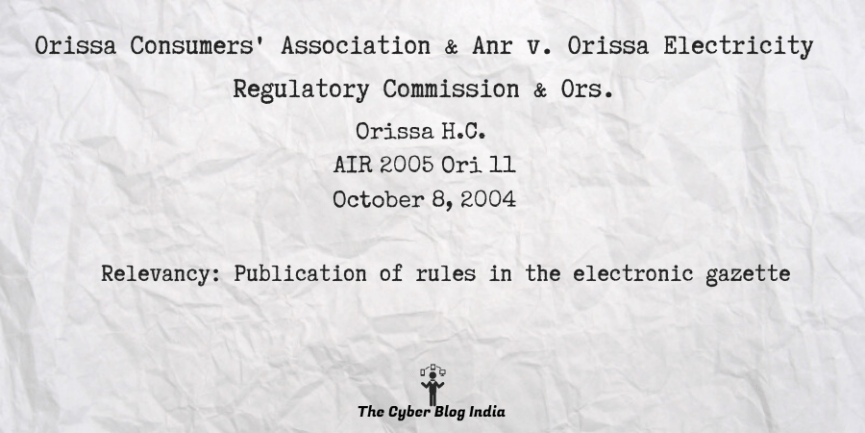Orissa Consumers’ Association & Anr v. Orissa Electricity Regulatory Commission & Ors.

Orissa Consumers’ Association & Anr v. Orissa Electricity Regulatory Commission & Ors.
AIR 2005 Ori 11
In the High Court of Orissa
W.P. (C) No. 7160/2004
Before Justice A.K. Patnaik and Justice A.K. Parichha
Decided on October 8, 2004
Relevancy of the case: Publication of rules in the electronic gazette
Statutes & Provisions Involved
- The Information Technology Act, 2000 (Section 2(1)(s), 4, 8)
- The Orissa General Clauses Act, 1937 (Section 24-A)
- The Societies Registration Act, 1860
- The Orissa Electricity Reforms Act, 1995 (Section 26)
- The Electricity Act, 2003 (Section 61, 62, 64, 172, 181(2)(zd))
- The Central General Clauses Act, 1897 (Section 23(5))
- The Electricity Supply Act, 1948
- The Electricity Regulatory Commission Act, 1998
- The Freedom of Information Act, 1967 (Section 6)
Relevant Facts of the Case
- The Respondents have been fixing the tariff for bulk and retail supply of electricity under the Orissa Electricity Reforms Act, 1995.
- The petitioners have alleged that the Commission and the State Government have failed miserably to protect the interests of consumers of electricity particularly those consumers who belong to low-income groups.
- According to the petitioners, the Commission had not framed regulations and yet the commission issued public notices inviting objections from the consumers for fixation of the tariff. They further stated that the commission cannot determine the tariff without first framing and publishing the Regulations.
- The petitioners also prayed for a writ of mandamus directing the Commission to frame the regulations and the State Government to furnish relevant information under Section 6 of the Freedom of Information Act, 1967.
- The Respondents claim that they have already framed different regulations. Hence, it had to be decided by the court whether the writ petition would be allowed or quashed.
Prominent Arguments by the Advocates
Mr Samareswar Mohanthy, Counsel on behalf of the Respondents:
- The Regulations have been put on the website. Hence, they will be deemed to have been published for the knowledge of all concerned in accordance with the provisions of the Information Technology Act, 2000.
Mr Jena, Counsel on behalf of the Petitioners:
- According to the case of Garware Nylons Ltd. v. Collector of Customs and Central Excise, Pune, the Supreme Court held that the effective date of a notification published in the Gazette is the date on which the Gazette containing the notification after printing became available for public sale.
Opinion of the Bench
- Section 2(1)(s) and 8 of the Information Technology Act, 2000 can not affect the conclusion that two regulations came into force on their respective dates. These provisions state the definition of electronic gazette and publication rules in electronic gazette respectively.
- If a notification is published in the electronic gazette, it is deemed to have been published in the official gazette.
- If a notification is published in official as well as electronic gazette, then the date of publication shall be deemed to be the date which was first published in any form.
- According to the case of Collector of Central Excise v. New Tobacco Co. etc., the word “published” means “made known to the persons likely to be affected by the notification.” Here, the persons likely to be affected were not just licensees who had filed tariff application, but also consumers of electricity including the low-income groups and consumers of rural areas who did not have means to collect information from the website of the Commission.
- There is no provision in the Information Technology Act, 2000 to the effect that publication in the Official or Electronic Gazette is conclusive proof that the notification containing the Regulations has been “published”.
- Section 64(2) of the Electricity Act, 2003 requires that tariff applications shall be published by the applicant to ensure that objections can be given by the public in response. The impugned notices had not been available for sale for the public and therefore, they were not in a position to find out whether the applications of the licensees were in accordance with the O.E.R.C. (Terms and Conditions for Determination of Tariff) Regulations, 2004 and file their objections within the specified period.
Final Decision
- The impugned notices in Annexure-1 series were quashed.
- The State Government and the Commission were directed to perform their respective duties under the Electricity Act, 2003 expeditiously.
- The writ petition was allowed to a limited extent. The parties were ordered to bear their own costs.
